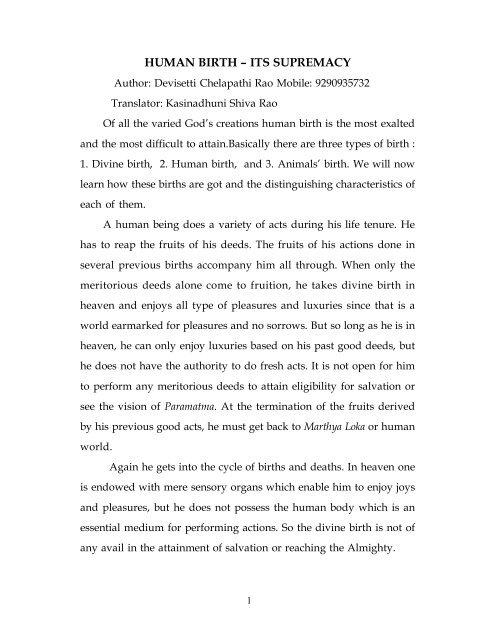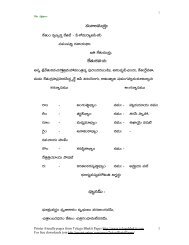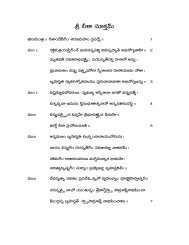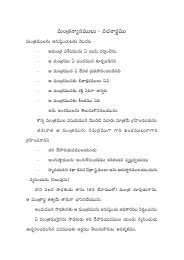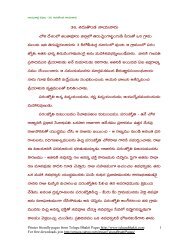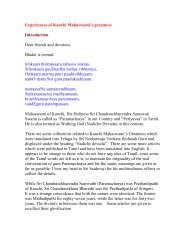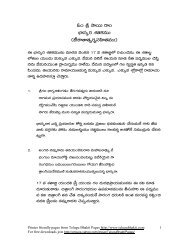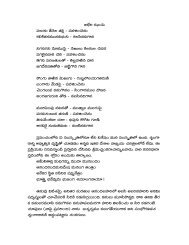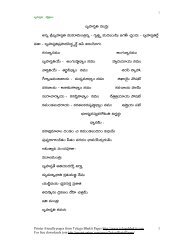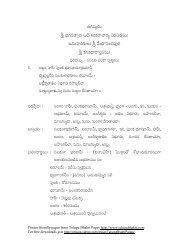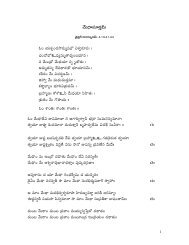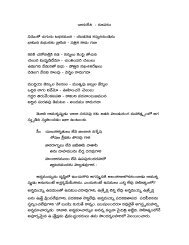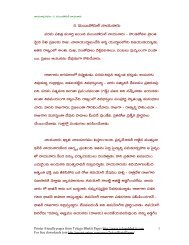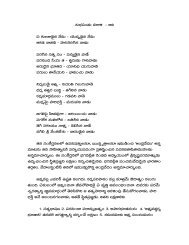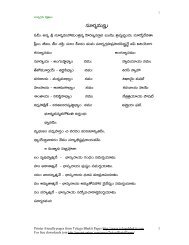human birth - Telugu Bhakti
human birth - Telugu Bhakti
human birth - Telugu Bhakti
Create successful ePaper yourself
Turn your PDF publications into a flip-book with our unique Google optimized e-Paper software.
HUMAN BIRTH – ITS SUPREMACY<br />
Author: Devisetti Chelapathi Rao Mobile: 9290935732<br />
Translator: Kasinadhuni Shiva Rao<br />
Of all the varied God’s creations <strong>human</strong> <strong>birth</strong> is the most exalted<br />
and the most difficult to attain.Basically there are three types of <strong>birth</strong> :<br />
1. Divine <strong>birth</strong>, 2. Human <strong>birth</strong>, and 3. Animals’ <strong>birth</strong>. We will now<br />
learn how these <strong>birth</strong>s are got and the distinguishing characteristics of<br />
each of them.<br />
A <strong>human</strong> being does a variety of acts during his life tenure. He<br />
has to reap the fruits of his deeds. The fruits of his actions done in<br />
several previous <strong>birth</strong>s accompany him all through. When only the<br />
meritorious deeds alone come to fruition, he takes divine <strong>birth</strong> in<br />
heaven and enjoys all type of pleasures and luxuries since that is a<br />
world earmarked for pleasures and no sorrows. But so long as he is in<br />
heaven, he can only enjoy luxuries based on his past good deeds, but<br />
he does not have the authority to do fresh acts. It is not open for him<br />
to perform any meritorious deeds to attain eligibility for salvation or<br />
see the vision of Paramatma. At the termination of the fruits derived<br />
by his previous good acts, he must get back to Marthya Loka or <strong>human</strong><br />
world.<br />
Again he gets into the cycle of <strong>birth</strong>s and deaths. In heaven one<br />
is endowed with mere sensory organs which enable him to enjoy joys<br />
and pleasures, but he does not possess the <strong>human</strong> body which is an<br />
essential medium for performing actions. So the divine <strong>birth</strong> is not of<br />
any avail in the attainment of salvation or reaching the Almighty.<br />
1
In the other case where the aggregate of sins committed by a<br />
<strong>human</strong> being ripen for enjoyment he takes the <strong>birth</strong> among animals,<br />
insects, birds, worms and germs through despicable processes of<br />
creation depending on the intensity of sinful acts committed by him.<br />
During this <strong>birth</strong> the Jeeva suffers all types of humiliations and tortures.<br />
In this <strong>birth</strong> the Jeeva is not endowed with the power of discrimination,<br />
but only with body and mind. Hence all the actions done now are not<br />
done with any deliberation but only with impulse provided by instinct.<br />
Hence during this <strong>birth</strong> the Jeeva is not competent to do any act<br />
towards attainment of Moksha, but can only enjoy the fruits of his<br />
deeds in the previous <strong>birth</strong>s. Thus the animal <strong>birth</strong> fails to achieve<br />
any thing or do any acts necessary to promote him to a higher stage<br />
and to have a vision of the Almighty.<br />
Let us now consider the third aspect where the fruits of merits<br />
and sins begin to yield mixed results. In this case Jeeva takes the <strong>birth</strong><br />
of a <strong>human</strong> being. During this phase he is subjected to enjoy pleasures<br />
and joys yielded by his past good deeds as also sorrows and afflictions<br />
thrust upon him through his past sins. Thus while enjoying the fruits<br />
of his previous merits and sins, man is in a position to do fresh actions.<br />
In this state he is blessed with body, mind and intellect and through<br />
their medium he is empowered to perform deeds (Karmas) with<br />
discrimination and deliberation. Thus <strong>human</strong> <strong>birth</strong> has the authority<br />
and opportunity to perform such meritorious deeds that enable him<br />
to reach Paramatma. Hence this <strong>birth</strong> is looked upon as the one that<br />
excels all other <strong>birth</strong>s and as the most difficult to attain. Since <strong>human</strong><br />
<strong>birth</strong> is got after passing through all the 84 lakhs of living species,<br />
2
Sankaracharya describes it in his’ Viveka chudamani’ as one that is the<br />
most difficult to attain. “Jantunam Nara Janma Durlabham”. So it is upto<br />
all the <strong>human</strong> beings to strive hard to make this highly exalted and<br />
excellent <strong>birth</strong> a worthy one.<br />
HOW TO MAKE THIS BIRTH WORTHY<br />
Generally all the <strong>human</strong> beings think and act in a similar fashion.<br />
Every one aspires to acquire things which make his life pleasant and<br />
comfortable. His ultimate aim is to become highly rich and enjoy life<br />
with his wife and children with all pomp and unending joys. But<br />
none is able to reach the point of complete satisfaction. The desires<br />
are endless and nonfulfilment persists at all stages and leaves the<br />
person discontented in so many ways. The reason for this lies in the<br />
transcient nature of the pleasures and joys he seeks. Everlasting and<br />
perfect bliss can be attained only through an object of permanence<br />
and sublimity and Paramatma is the only entity of eternal existence.<br />
Sankaracharya states this in his<br />
“Tatwa Bodha” as “Nitya Vastvekam Brahma Tadvyati riktam<br />
sarvam Anityam”<br />
It is therefore evident that until and unless man achieves the<br />
blissful joy from God the everlasting phenomenon, he does not rest<br />
contented. To attain that permanent bliss should be the ultimate aim<br />
and fulfillment of a worthy life. This eternal bliss is otherwise termed<br />
as salvation or emancipation from all the wordly attachment or bonds.<br />
BONDS EXPLAINED<br />
3
Bonds are nothing but results of our actions. Whatever acts we<br />
keep on doing through innumerable <strong>birth</strong>s become the fruits and do<br />
not leave us, but bind us to this world. Impelled by desires, we<br />
perform so many deeds and acquire through them all types of riches<br />
and possessions. But these material acquisitions do not go with us<br />
after death. But the actions, reflections and other thoughts which we<br />
adopt accompany us transforming themselves into effects of our deeds<br />
and fasten us to this world. And as long as these bondages last we are<br />
bound to the cycle of <strong>birth</strong>s and deaths with this body. In order to get<br />
liberation from these <strong>birth</strong>s and attain permanent bliss, we have to<br />
make an effort to free ourselves from the bondages. But how to get<br />
rid of the bonds ? For that we need clear perception of the Theory of<br />
Karma.<br />
THEORY OF KARMA EXPLAINED<br />
What the constitution does for the governance of a country, the<br />
Path of Karma does for the conduct of creation as a whole.<br />
The Constitution of a country is conceived and framed by <strong>human</strong><br />
genius, hence it is prone to go wrong somewhere and amendments<br />
become necessary from time to time. And it provides for some<br />
exemptions also to certain sections of the society.<br />
On the other hand the path of Karma is evolved by the Almighty<br />
and hence it is permanent and flawless. No one can claim any<br />
exemption from its operation. There is no room for nepotism,<br />
favouritism and other corrupt practices in its implementation. All are<br />
equal before it.<br />
4
Inspite of his being the father of lord Sri Rama, Dasaratha could<br />
not escape the pangs of separation from his beloved son which resulted<br />
in his death. Though Devaki and Vasudeva were the parents of Sri<br />
Krishna, an incarnation of God Srimannarayana, they had to suffer<br />
hard jail life and they could not avert the sorrow resulting from their<br />
son’s separation. Thus the path of Karma takes its course based on<br />
the actions done by an individual and is just like an edict which is<br />
inviolable.<br />
Karma (Action) Defined<br />
The word Karma has more than one sense. Rituals and the like<br />
also come under Karmas besides activity in general. Thus whatever<br />
deeds we do from morning till the time of our sleep in the night, are<br />
all Karmas. Every <strong>human</strong> being keeps on performing acts from <strong>birth</strong><br />
to death and such acts yield results. Even the fruits of the acts are<br />
called Karmas. It is a certainty that every act yields fruits. Depending<br />
upon the time taken by actions to produce results they are classified<br />
into three divisions. They are :<br />
1) Agami Karmas (Current Acts) 2) Sanchita Karmas<br />
(Accumulated Acts) and 3) Prarabhdha Karmas (such of the<br />
accumulated Karmas which ripen and become ready for being<br />
experienced by the <strong>human</strong> being are termed Prarabhdha Karmas)<br />
1. Agami Karmas (Current Actions)<br />
Whatever actions we do now are to be classified as Agami Karmas.<br />
Of these some yield instant results and withdraw from further<br />
5
operation. Some others remain dormant for the time being and get<br />
accumulated for giving results in future at the appropriate time.<br />
Take for instance our taking food when we are hungry. Our<br />
hunger is immediately satisfied. Here taking food is an action and<br />
satisfaction of hunger is the result of the act. Similarly when we feel<br />
thirsty, we drink water. Our thirst is quenched at once. Here too<br />
drinking of water is an act and quenching of thirst is its result. Let us<br />
consider another case. When we get angry against a person, we beat<br />
him. If the other person is in a position to retaliate, he will return the<br />
blow. While our beating the person first is an action, the other man<br />
returning the blow is the result of our act. In all the above cases we<br />
observe that our acts produce instant results and get dissolved.<br />
Yet, there are some actions which do not produce immediate<br />
results. Let us take a case where we curse a person, accusing him of<br />
some misdeeds, in his absence. Since that person is not before us,<br />
there is no reaction or result for our act. So also when we do charities<br />
or meritorious deeds we do not reap the result immediately. Similarly<br />
when our children appear for examinations the results are known only<br />
after some months. So in these latter instances the Karmas remain<br />
inert for a certain period for yielding results at a future point of time.<br />
These are also called current actions or Agami Karmas.<br />
II. Sanchita Karmas (Accumulated Acts)<br />
Of the total Karmas performed in a <strong>birth</strong> some yield instant results<br />
and get dissolved. The rest get stored for yielding fruits in the coming<br />
<strong>birth</strong>s. Similarly some deeds done in earlier <strong>birth</strong>s also might get<br />
accumulated and both these types of Karmas are carried forward.<br />
6
The above two categories of Karmas come under the classification of<br />
Accumulated Karmas or ‘Sanchita Karmas’. It is note – worthy that even<br />
though Jeeva sheds off his body due to death, the accumulated karmas<br />
do not leave him, but accompany him to the next <strong>birth</strong>s till their fruits<br />
become ripe for enjoyment.<br />
When we change rented houses we carry with us all our<br />
belongings from the previously occupied house to the new house.<br />
Similarly when Jeeva leaves the body, which can be compared to a<br />
rented house let out by God, he carries forward all the Sanchita Karmas<br />
(accumulated fruits) acquired by his Karmas done in the course of the<br />
previous <strong>birth</strong>s and enters another suitable body (or a rented new<br />
house) kept ready by God. These reserves of Karma fruits which the<br />
Jeeva carries from <strong>birth</strong> to <strong>birth</strong> are Accumulated Karmas or ‘Sanchita<br />
Karmas’.<br />
III. Prarabdha Karmas<br />
We have learnt how the Jeeva carries forward with him the<br />
Accumulated Karmas from <strong>birth</strong> to <strong>birth</strong>. Such of the said Karmas<br />
which become ripe for enjoyment in the current <strong>birth</strong> are called<br />
Prarabdha Karmas as far as that <strong>birth</strong> is concerned. Jeeva enters a body<br />
appropriate for its occupation based on the Prarabdha Karmas and<br />
emerges into the world with that body. That body lasts till the<br />
completion of enjoyment of the Prarabdha Karmas. Till that time, the<br />
Jeeva dwells in that body and leaves it the next moment the enjoyment<br />
is fulfilled. Till that moment, however hard the Jeeva may endeavour<br />
7
or whatever steps he may take , they will not be of any avail to him in<br />
leaving that body.<br />
In this process this <strong>birth</strong> ends as soon as the enjoyment of Prarabdha<br />
Karma is completely over. But the Accumulated Karmas pertaining to<br />
the prior <strong>birth</strong>s still remain and to them are added those that are<br />
acquired during the current <strong>birth</strong>. From this sum total of Karmas,<br />
those that come for fruition are take as Prarabdha Karmas and the Jeeva<br />
enters an appropriate body and taken <strong>birth</strong> to fulfill the enjoyment of<br />
such karmas. In this way the wheel of <strong>birth</strong> and death rotates.<br />
Sankaracharya propounds in the following lines extracted from<br />
his ‘Bhajagovindam’, the same truth.<br />
“Punarapi Jananam Punarapi Maranam<br />
Punarapi Janani Jathare Sayanam”<br />
These lines convey that the Jeeva has to pass through innumerable<br />
number of <strong>birth</strong>s and deaths and for every <strong>birth</strong> has to enter the<br />
mother’s womb and suffer the attendant pangs. Where is the end of<br />
this cycle of <strong>birth</strong>s and deaths then? When does he get liberation from<br />
this chain ? Is there not a way to get salvation and attain the state of<br />
eternal bliss ? Yes, there is. Godmen have shown us the way and it is<br />
discussed in the following chapter.<br />
How to get liberation from the cycle of Births and Deaths<br />
Let us now examine the causes of <strong>birth</strong> in this world. Birth occurs<br />
where Prarabdha Karmas remain to be enjoyed. In the absence of<br />
Prarabdha Karmas there is no <strong>birth</strong>. If so where from do these Prarabdha<br />
Karmas arise? They result from such of the Sanchita Karmas which ripen<br />
8
for enjoyment. Then how do these accumulated karmas make their<br />
appearance ? Such of those actions which still remain after exhaustion<br />
of the ripened ones by enjoyment are carried forward to the next <strong>birth</strong><br />
and they are called ‘the Accumulated Karmas’. If we therefore wish<br />
that there should not be accumulated karmas in our lives, there should<br />
be cessation of all activities or quiietism. But in worldly life it is not<br />
possible to desist from performing actions. Here it is relevant to quote<br />
Bhagavan’s postulation in ‘Geeta’.<br />
“Na hi kaschit Kshanamapi Jatu Tisthatya Karma Krut”.<br />
‘As long as life lasts one keeps on doing one act or the other’ is<br />
what is sought to be conveyed in the above expression.<br />
The same concept is stated in ‘Esavasyopanishat’ in the following<br />
lines :<br />
“Kurvanneveha Karmani Jijeevishet Chchatagum samah<br />
Evam Twayi Nanyathetosti Sakarma lipyate nare”.<br />
One has to keep on doing karmas and live for hundred years in<br />
this world, there is no other way. Actions by themselves do not fetch<br />
disrepute to man. So one has to continue doing acts all through his<br />
life. This is the gist of the above mantra.<br />
Choosing the Right Type of Karmas<br />
We have considered that by abstaining from doing acts we can<br />
emancipate ourselves from further <strong>birth</strong>s. We have also seen how it<br />
is impossible for any body to live without doing any act. So what is<br />
left to us is to select such types of deeds which save the Jeeva from<br />
further <strong>birth</strong>s.<br />
9
If we do sinful and contemptible acts we are bound to take<br />
despicable <strong>birth</strong>s. On the otherhand if we perform meritorious and<br />
virtuous deeds we are ordained for divine <strong>birth</strong>s and become eligible<br />
to enjoy happy and comfortable lives. Similarly if we perform both<br />
meritorious as well as sinful acts, we attain <strong>human</strong> <strong>birth</strong> and be<br />
subjected to enjoy pleasures as well as miseries. Thus in all the above<br />
three cases the Jeeva is bound by the bondage of his acts and has to<br />
pass through the ordeal of one type or the other of <strong>birth</strong>s.<br />
Meritorious deeds yield golden shackles. Sinful acts give iron<br />
shackles. But both are shackles and bind the Jeeva. So, in essence, while<br />
there is no escape from doing any act, there is also no escape from<br />
reaping the results of such acts. In the ultimate analysis of things,<br />
man has to elect such acts and do them in such a way as the acts will<br />
not yoke him to their fruits. How to choose the method of doing<br />
actions by which he is not bound by their results is discussed below.<br />
1) While performing Agami Karmas, we must choose such deeds<br />
which yield immediate fruits and avoid those which give results on a<br />
future date. This process will avert the scope of fresh fruits being<br />
generated by our acts. And since the fruits yielded by our actions are<br />
enjoyed immediately there is no accumulation of fruits.<br />
2) In the case of Prarabdha Karmas we have to wipe them out by<br />
enjoying them exhaustively, without getting effected.<br />
3) But the real trouble springs up in respect of Sanchita Karmas.<br />
When they are not ripe we cannot enjoy them and remove them from<br />
the scene : nor is it open to us to be wary about them in this <strong>birth</strong>,<br />
since they are there as a result of our actions performed during several<br />
10
previous <strong>birth</strong>s. And to attain a state of their total extinction, we need<br />
to pass through myriad number of <strong>birth</strong>s. So the only way of rescuing<br />
ourselves from these accumulated karmas is to burn them all at one<br />
time. We will now learn how this is made possible.<br />
In the above paragraphs we have seen how we have to aim at<br />
getting rid of the three different types of karmas and their fruits. In<br />
the absence of karmas and the accompanying fruits, we are free from<br />
bondages. And consequently there will be no <strong>birth</strong>s and the attendent<br />
miseries. That is the ultimate state of eternal bliss which we should<br />
attain. But the crucial problem lies in cultivating the right type of<br />
effort and adopting the correct path to get emancipation from the<br />
bondages comprehensively. To achieve that end we need<br />
enlightenment. And Bhagavadgita, which is a treasure house of Yoga<br />
and Upanishadsara, is the only guide which can lead us on to the right<br />
path to salvation.<br />
The first six chapters teach us about how to do karmas and how<br />
we have to avert the culmination of current actions into Accumulated<br />
Karmas through Karma Yoga.<br />
In the same way, how to liquidate the Prarabdha Karmas after<br />
enjoyment through <strong>Bhakti</strong> yoga is dealt with in chapters 7 to 12 with a<br />
discussion of the six - fold aspects of devotion.<br />
Finally in chapters 13 to 18 Bhagavan elucidates the six aspects<br />
of Jnana and how to burn the accumulated karmas in the fire of Jnana<br />
or knowledge through Jnana yoga.<br />
Our aim is therefore to understand and assimilate the means and<br />
secrets of attainment of the sublime state of Nirvana, after freeing<br />
11
ourselves from the bondages, taught by Bhagavan in Bhagavadgita<br />
through Karma, <strong>Bhakti</strong> and Jnana Yogas. Let us now have a glimpse of<br />
the secrets and means expounded by Bhagavan in the said chapters.<br />
A) AGAMI KARMAS - PERFORMANCE WITHOUT BEING<br />
BOUND BY BONDAGES<br />
Whatever we do at the present time is Agami Karma and we are<br />
bound to reap the fruits of such deeds. This is what is ordained by<br />
karma theory. In the result the fruits of our actions turn to bondages.<br />
In this context Bhagavan preaches us in the Karma Yoga or Buddhi<br />
Yoga of Geeta about the means we have to employ for escaping the<br />
tie-up of the bondages to us while performing the current acts. Those<br />
means are :<br />
1) Performing the act without being conscious that you are the<br />
doer :<br />
2) Performing the act without the least aspiration for its fruits.<br />
3) Doing the act entirely for the welfare and benefit of all the<br />
living beings and to please the Almighty.<br />
4) Performing the acts in the dedication of God.<br />
Elucidation : -<br />
1) To perform acts with the feeling and awareness that you<br />
are not the doer<br />
Normally whoever does an act he will be the recipient of its fruit<br />
because he feels he is the doer. But when one does an act being fully<br />
conscious that he is not the doer but he does the act as agent of God<br />
then the fruit of his deed goes to the Karta or the principal but does<br />
12
not touch the individual. Here the individual has to perform the act<br />
not with the feeling of a doer but with the awareness of a man bound<br />
by duty.<br />
Take the case of a person who kills his enemy out of rage. This<br />
is done with full deliberation and he becomes the doer of the act.<br />
Hence he has to suffer its consequences or the fruit of his act of murder.<br />
Suppose an executor kills a criminal by hanging him in<br />
pursurance of a judicial order, the executor does the act under a duty.<br />
Hence he does not receive the fruits of his act.<br />
Similarly when a judge inflicts capital punishment to a murderer,<br />
he does that act in accordance with the law of the land. Here too the<br />
judge is not the actor but a person acting under an obligation towards<br />
law.<br />
So one has to perform acts being fully conscious that he is not<br />
the doer, but he is doing it in the capacity of a person under obligation<br />
to do the said act. In other words he should feel that he is an instrument<br />
in the hands of God and under an obligation to execute His will. “God<br />
is the ordainer and I am only an actor under him” should be his feeling.<br />
And this attitude should prevail invariably in all situations.<br />
Consider the case of a ryot who grows a garden. With fragnant<br />
flowers and luscious fruits the garden is highly attractive and becomes<br />
cynosure for the viewers. If a passerby, seeing the garden, asks the<br />
ryot, “Who is it that has grown this splendid garden”, the ryot answers<br />
with pride that he is the sole person that grew it. Later on when a cow<br />
entering into the garden destroys most of the plants, the ryot beats<br />
the cow with a stick and the cow dies. When the persons living in the<br />
13
neighbourhood see the cow being killed by the ryot, warn him that he<br />
has to suffer the consequences of doing cow slaughter, the ryot argues,<br />
“It is the stick that hit the cow, and it is my hand that held the stick.<br />
The hand is a unit which can perform and Indra is the commanding<br />
God for the hand. Hence if any sin is attributable to cow slaughter,<br />
Indra is the target, but not I”. When the question of receiving<br />
compliments for growing a beautiful garden arises, the ryot proudly<br />
claims that he is the doer, but when the issue of owning the<br />
responsibility for the sin arising out of cow slaughter comes up, he<br />
takes the plea that he played the part of a person under obligation.<br />
This is a clear case of selfishness where philosophic tenets are given<br />
perverted interpretation.<br />
2) Performing acts without selfish desire.<br />
In this world whoever does an act, he does it with an eye on its<br />
fruits. A normal man considers doing an act without selfish desire as<br />
foolish and unwise.<br />
But if acts are done with a desire to enjoy the resultant fruits,<br />
those fruits become bondages. When we do good deeds like<br />
worshipping God, giving charities etc., we expect to reap positive<br />
benefits. And such benefits are a certainty. But of what use are these<br />
benefits ? They enable us to be born in heaven and enjoy all types of<br />
pleasures and joys. But as soon as the fruits of our Karma become<br />
extinct, we are thrown back to the <strong>human</strong> world. Being in heaven we<br />
cannot perform further meritorious deeds necessary to elevate us to<br />
enter God’s kingdom. For, heaven is a place for enjoyment of luxuries<br />
but not for doing Karmas. Whatever acts we have to do for reaching<br />
14
the Almighty, can be done only in this world. There is therefore no<br />
use performing deeds for the sake of fruits. So Karma is not our real<br />
enemy but kama or desire is our virtual foe. Hence the necessity of<br />
doing acts without any selfish desire. That is the reason why at the<br />
end of every ritual of worship, we utter the mantra. “Etat phalam<br />
sarvam Parameswararpanamastu” which means that whatever fruit that<br />
results out of this rituals shall be dedicated to God.<br />
So we have to restrict our role while fulfilling a deed. That is,<br />
we should have no concern for the result that comes out of it. This<br />
concept has been started by Bhagavan thus :<br />
“Karmanyevadhikaraste Maaphaleshu Kadachana<br />
Makarma phala heturbhuh Mate sangostwaKarmani.”<br />
(II Chapter 47th verse)<br />
So our part ends with the completion of a deed. We shall have<br />
no desire for the fruits and the same shall be offered to the Almighty.<br />
In this attitude also there should not be any selfish motive. Let<br />
us examine a curious illustration. A learned man goes to market and<br />
purchases some articles. He engages a rickshaw and gets back home<br />
with the articles. The rickshaw fellow demands money for his services.<br />
The learned man then quotes the line in Bhagavadgita,<br />
Karmanyevadhikaraste Maphaleshu Kadachana<br />
This means - ‘your duty is to perform an act. You should not<br />
have any say in the fruit of your deed’. Then the rickshaw fellow says,<br />
“I am a small fellow, don’t expect me to know about high things.<br />
Now that you have enlightened me, I will act without desiring for the<br />
15
fruit”. So saying he picks up the bag of articles lying there and is<br />
about to leave the place. Then the learned man realises his folly. Here<br />
it is not the learned man’s conviction in the stated principle that comes<br />
into play, but his selfish desire to exploit the ignorance of the other<br />
party. Such deeds only increase the bondage twofold.<br />
Some people declare that they perform acts without any<br />
aspiration for fruits. Thieves commit theft and when they are caught<br />
and subjected to punishment for their crime, they cleverly say that<br />
they did the act of stealing without any desire for its outcome. What<br />
they mean here by the outcome is the punishment for their act of<br />
theft.<br />
In the same way men in service resort to corrupt practices and<br />
they do not like to receive the fruits for their act in the shape of<br />
punishment for their misconduct. Even murderers when they are<br />
apprehended, declare that they are not interested in receiving the fruit<br />
or punishment for their crime.<br />
In all these cases the concerned actors of the deeds exhibit<br />
disinclination to receive the fruits, because they are negative. If the<br />
fruits are beneficial to them they are ready to receive them.<br />
Some do ‘Putra Kamestiyaga’ with a desire to be blessed with<br />
sons. Some do penance seeking power to kill their enemies and some<br />
others like Bhasmasura wanting the magic power to kill any person<br />
they want by placing their hands on the heads of their targets. These<br />
are all instances of Kamya <strong>Bhakti</strong> or devotion motivated by selfish<br />
desire. Similar are the cases where people worship different deities<br />
seeking different types of desires. A seeker of wealth worships<br />
16
Lakshmi and a candidate for election gives his hair to Lord<br />
Venkateswara. These acts done with strong selfish desires lead to<br />
severe type of bondages. If one has to avert bondages he has to<br />
perform acts without any selfish desire. The sun gives us sun-shine,<br />
Vayu the wind god provides life giving air, trees give us shade and<br />
great people lead us in the righteous path. What is the return these<br />
agencies expect for their noble acts ? None. Being helpful to others is<br />
their nature. Taking their example we must conduct worship and<br />
other sacred rituals, charities and philonthropic acts, prompted by the<br />
desire of keeping the Almighty in our memory. Only such deeds can<br />
be termed acts without selfish ends and do not create any bondages.<br />
3) Performing actions for the welfare of mankind and to please<br />
God.<br />
Actions done without any selfish motive and for the benefit of<br />
the majority of the community are not Accumulated Karmas. Speaking<br />
untruth is a sin. Yet, Sri Krishna induces Dharmaraja to utter in order<br />
to establish dharma or righteousness in land. Such acts cannot be<br />
classified under accumulated actions. In the same way sacred rituals<br />
and worship intended to usher in prosperity for the mankind are not<br />
accumulated actions and hence do not generate bondages.<br />
4) Performing the Karmas (acts) in the spirit of dedication to<br />
God:-<br />
Whatever Karmas we do every day, if we dedicate them to god,<br />
they do not become bondages to us. But how to enact that process is<br />
the question.<br />
17
We prepare tamarind rice and curd rice etc and offer them to<br />
God as ‘Naivedyam’. In that process they get sanctified as God’s<br />
‘Prasadam’. Each of the devotees consumes a little of it, irrespective of<br />
its taste or quantity or agreability. This is the way how any thing is<br />
dedicated to god. This may hold good in the case of material things<br />
which can be easily offered to God with dedication and received back<br />
as Prasadam. But how to dedicate actions to God and receive them as<br />
Prasadam is the question.<br />
Even for it, there is a way. At the time of starting a work and<br />
during the time of processing it and finally at the time of its completion<br />
if one prays to God, it will amount to dedicating the work to God.<br />
Not only that, whatever type of results that are yielded by a work,<br />
whether good or bad, whether beneficial or harmful, whether small or<br />
big, must be accepted by the doer with a sense of gratitude treating<br />
the result as God’s Prasadam.<br />
By following this method, the work becomes a God-dedicated<br />
one. In this process, the doer’s heart is purified and in the result the<br />
doer is enabled to attain Moksha.<br />
The above truth has been stated by Ramana Maharshi as follows<br />
in his ‘Upadesa saram’. “Eswararpitam Nechchaya Krutam, Chitta<br />
Sodhakam Mukti Sadhakam”.<br />
This type of dedication of Karmas to God is easier than other<br />
methods.<br />
As stated above, if one does an act without being conscious that<br />
he is the actor, but only an obliger or an agent, not desiring to enjoy<br />
the fruits, having the welfare of the community at the bottom of his<br />
18
heart, and to please the Almighty, and in the spirit of dedication to<br />
God that method of approach is termed Karma Yoga. So acts done in<br />
the Karma yoga way obviate the current deeds becoming accumulated<br />
karmas and do not accompany us through <strong>birth</strong>s and become bondages.<br />
So when we perform acts we must think well and follow the<br />
guidelines given in the sacred texts. Even the mind and sense organs<br />
must be attuned suitably. Our actions can be compared to an arrow<br />
ready to be released to strike the target. As long as the arrow is held<br />
in our hands, we have command over it and we should exercise<br />
sufficient care before releasing it. Our aim should be to escape from<br />
the bondages by targetting our actions in the Karma yoga way.<br />
B) HOW TO AVERT THE ACCRUAL OF BONDAGES FROM<br />
PRARABDHA KARMAS<br />
Such of the Accumulated Karmas which ripen for enjoyment at<br />
the point of Jeeva leaving the body are called Prarabdha Karmas. The<br />
Jeeva then takes another body or <strong>birth</strong> for which he is made eligible to<br />
enjoy the Prarabdha Karmas. The Jeeva has to enjoy completely all the<br />
Prarabdha Karmas. Only then the said karmas get extinguished and the<br />
jeeva will be relieved of them.<br />
The great, the intellectual, the sacred and even the devotees<br />
can’t claim exemption from Prarabdha Karmas. They are just like an<br />
arrow released from a bow. The arrow must hit some object or the<br />
other. When once it is released it can’t be taken back.<br />
“Ennichotla tirigi Epatlu padinanu<br />
Antaniyaka Sani Ventadirugu<br />
Bhumikrottadaina Bhuktulu Krottava<br />
19
Viswadabhirama Vinura Vema”.<br />
We may wander any where and we may experience any kind of<br />
ordeals, the Prarabdha karmas do not leave us but chase us. This<br />
truth is stated by Vemana in the above verse.<br />
The doer of the karma has to enjoy its fruits. No one, however<br />
great he may be, can escape it.<br />
In the epic Ramayana, Rama leaves for forest along with Seeta<br />
and Lakshmana on exile. This happens when Bharata is away from<br />
capital. On coming back to Ayodhya, Bharata plunges into grief on<br />
learning about Rama’s exile. He is greatly annoyed at his mother’s<br />
role thereof and expresses his resentment to her in harsh terms. Then<br />
he goes to Vasishtha, their family guru and gives vent to his grief.<br />
Vasishtha consoles him and tells him, “Joy, or sorrow, <strong>birth</strong> or death,<br />
fame or disgrace - all these are controlled by Prarabdha and they must<br />
take their own course as preordained.”<br />
i) If we study Ramayana under this perspective we will perceive<br />
who experienced joy and who suffered grief. Examine the case of<br />
Sabari. She is an old decrepit, uncivilized tribal woman living in an<br />
obscure spot in the forest. Yet she is an ardent devotee of Sree Rama.<br />
Her only hope is to see Rama and die at his feet. It never occurred to<br />
her whether it is within her reach or not to realise her ambition. Still<br />
she hopes to see him and anxiously waits for the occasion. Ultimately<br />
that moment arrives. Rama goes to her and presents himself before<br />
her. Sabari’s joy knows no bounds.<br />
Now look at Kausalya’s fate who is Rama’s own mother. When<br />
she is childless she goes through great agony. When Rama is born<br />
20
she spends happy days in his company. But when Rama leaves for<br />
forest, she is again subjected to deep sorrow. Along with the separation<br />
of her son comes the blow of the death of her husband.<br />
On one hand Sabari, a woman who has no kind of any relationship<br />
with Rama experiences inexplicable joy, with her life amibition being<br />
fulfilled on the other, Kausalya, Rama’s own mother is subjected to<br />
immense grief arising out of separation from her beloved son as well<br />
as death of her husband.<br />
ii) Let us now consider about the effect of Prarabdha in respect<br />
of <strong>birth</strong> and death.<br />
Ahalya is the wife of saint Gautama. She is turned into a stone<br />
as a result of her husband’s curse. When Sri Rama goes out for the<br />
protection of Viswamitra’s yaga he touches the stone with his feet<br />
and Ahalya gets back her previous womanhood. Contrast this with<br />
the fate of Dasaratha, Rama’s father. When Rama is exiled and leaves<br />
for forest, Dasaratha is immersed in great sorrow. Grief striken, he<br />
breathes his last uttering the name of Rama repeatedly in his last<br />
moments.<br />
We are able to perceive here that Ahalya, quite unconnected<br />
with Rama is restored to her previous <strong>birth</strong>, while Dasaratha, Rama’s<br />
own father, meets his end driven to a state of extreme grief, due to<br />
separation from Rama.<br />
iii) We will now take for analysis , how in respect of fame and<br />
disgrace, events take shape<br />
Ravana is the culprit who abducts Rama’s wife Sita. It is Rama’s<br />
responsibility to punish Ravana. And he ought to take the assistance<br />
21
of his brothers and the military force of Ayodhya. Curiously neither<br />
Rama’s brothers Bharata and Satrughna nor the military of Ayodhya<br />
knows anything about the war that takes place between Rama and<br />
Ravana. It fell to the lot of Anjaneya, Sugreeva, Vibheeshana and<br />
Jambavan, who belong to monkey race and Rakhasa race, and who<br />
are quite unconnected with either Rama or Ayodhya Kingdom, to<br />
participate in the war and snatch away the fame of serving Rama.<br />
Then who is it that shared the disrepute in this story ?<br />
Let us now turn our attention to Kaikeyi, Rama’s step mother.<br />
She tends Rama with profound affection more than his own mother.<br />
She is greatly rejoiced at the news of Rama’s coronation. But she<br />
becomes instrumental in stopping the coronation and sending Rama<br />
to forest and becomes the target of disrepute, besides receiving<br />
reprimands from her own kith and kin as well as the people of<br />
Ayodhya.<br />
All these happenings are the result of Prarabdha Karma. We too<br />
cannot escape the clutches of the Prarabdha Karma. Whatever we<br />
experience in the shape of afflictions, losses, fears, pleasures and pains<br />
are all due to Prarabdha.<br />
When we face adversities in life we feel miserable and unhappy.<br />
But we must develop an attitude of preparedness to suffer the fruits<br />
of these karmas. We must feel happy that our indebtedness is being<br />
wiped out and our karmas are getting exhausted. Let us take an<br />
example. We borrow some money from some body for our needs.<br />
The debt has got to be liquidated. So at the time of discharge of the<br />
debt, we should not feel unhappy for having to part with our money.<br />
22
On the other hand we should feel delighted for being able to discharge<br />
our debt. After enjoying and expending the karmas we should feel<br />
relieved for lessening the load of accumulated karmas, in the process.<br />
But it is easier said than done. When one has to face hardship,<br />
how can he be cheerful ? How can he bear the brunt ? For that Bhagavan<br />
has indicated a good path in Bhagavadgita. In those circumstances<br />
one must cultivate devotion towards Lord and worship him. That<br />
will strengthen his fortitude to enable him to bear the brunt of miseries<br />
arising our of the Prarabdha Karmas. This experience is called <strong>Bhakti</strong><br />
Yoga.<br />
A boy returning from the market is knocked down by a cyclist.<br />
He is severely injured and beigns to cry, unable to bear the pains. His<br />
parents go there, take him to a hospital and do whatever that is needed.<br />
They attend to him with due care and affection. Still, the boy, unable<br />
to put up with the pain asks his father, “Father , can you take my<br />
pain?” The parents can nurse the child in all possible ways but cannot<br />
take his pain. Similarly the fruits of one’s Prarabdha Karmas must be<br />
enjoyed by him alone. But if we seek the mercy of God, who is just<br />
like our parents, he will mitigate the severity of their painful phase.<br />
With his prop we will be able to bear the hardships. We shall have<br />
therefore to enjoy or suffer the fruits of Prarabdha Karmas and liquidate<br />
them through <strong>Bhakti</strong> Yoga.<br />
C) HOW TO AVERT SANCHITA KARMAS RESULTING IN<br />
BONDAGES<br />
We have freedom in performing Agami Karmas. By adopting<br />
the karma yoga, in the process of performing them, we can avert<br />
23
ondages. Prarabdha Karmas are dissolved by enjoyment in the<br />
<strong>Bhakti</strong>yoga way. But what about Sanchita Karmas ? They are the deeds<br />
which were performed in several previous <strong>birth</strong>s. They are also not<br />
amenable for being wiped out by enjoyment, because they are not<br />
ripe. They collect and form a bundle and follow us from <strong>birth</strong> to <strong>birth</strong><br />
waiting to be enjoyed at an indefinite future time. In order to exhaust<br />
them we have to take several <strong>birth</strong>s. So if we have to break this chain<br />
of <strong>birth</strong>s and attain eternal bliss, we have to get deliverance from the<br />
bondages of karmas. That becomes possible only when we are able<br />
to burn these karmas in the fire of knowledge.<br />
Jnanagnih Sarva Karmanam - (Bhagavadgita).<br />
It is stated in Bhagavadgita that all karmas are to be extinguished<br />
by burning them in the fire of knowledge. That is the only way of<br />
freeing ourselves from all karmas. But this is a stupendous task. This<br />
is as difficult as walking on a wire in a circus. This process or method<br />
of eradicating the effect of the bundle of Karmas is called Jnana Yoga.<br />
Knowledge defined :<br />
Knowledge is nothing but knowing thyself, that is knowing your<br />
own Atman.<br />
The real identity of a <strong>human</strong> being is that of Satchidananda. But<br />
we identify ourselves with the physical body which is transcient and<br />
which we leave at the time of death. We also feel assured that the<br />
sense organs which we avail for transacting the worldly affairs belong<br />
to us and they are the constituents of our real structure. But in reality<br />
the body as well as the sense organs are mere instruments and they<br />
are not the ‘I’ or Atman. Without making a serious effort to know<br />
24
about the self, to identify the ‘I’ with the body, mind and sense organs<br />
is ignorance. This ignorance will lead us to miseries and fears. We<br />
have to get rid of this ignorance and know the self which is nothing<br />
but Satchidananda. This realisation which one gets through experience<br />
is knowledge. This knowledge of self generates fire of awakening. To<br />
realise the knowledge of self we need the guidance of a preceptor<br />
(Guru).<br />
There is a lion in a forest. It gives <strong>birth</strong> to a cub and dies. The<br />
cub lies at the spot helplessly. A shepherd going that way driving his<br />
sheep home, sees the cub, takes pity on it and carries it home. He<br />
brings it up along with his sheep. The cub eats and drinks along with<br />
the sheep and becomes one with them. One day a lion sees the sheep<br />
and the cub grazing in the forest. He feels immensely delighted and<br />
chases the sheep for killing them for his food. The sheep run fast and<br />
along with them the cub too, in a freightened state.<br />
The lion sees the cub also running along with the sheep with<br />
fear. He runs fast and takes hold of the cub. The cub shivers with<br />
great fear, and pleads with the lion plaintively not to kill it. The lion<br />
asks the cub why, being a lion, it is in a frightened state like the sheep<br />
which belong to a lower strata of animals. The cub repeatedly asserts<br />
that it is only a sheep and does not belong to the family of lions.<br />
Then the lion takes the cub to a tank. Bending into the water he<br />
asks the cub to see its image in the water. The cub sees the image of<br />
the lion in the water. Then the cub is made to see its own image also in<br />
the water. The lion then asks the cub “What do you see in the water?”<br />
The cub replies, “I see a lion in both the cases”. When the cub sees its<br />
25
own image, though it feels that it is also a lion, it is at first hesitant and<br />
takes some time to feel assured of the fact.<br />
Then the lion roars loudly and asks the cub also to do it. The cub<br />
roars for the first time and feels sure that it is only a lion and not a<br />
sheep. So feeling the cub walks into the forest like a real lion shedding<br />
off its sheepishness and fear.<br />
Till that moment the cub forgets its real state. On account of its<br />
association with sheep, it is overtaken by the illusion that it is a sheep.<br />
Now that it realises its real state, it gets rid of its previous qualities<br />
and begins to behave like a lion.<br />
Just like the cub we forget our identity. The ‘I’ is identified with<br />
the body and sense organs, out of ignorance. When we are really<br />
lions, we are under the misapprehension that we are sheep. All our<br />
miseries, afflictions and fears spring up because of that erraneous<br />
perception. If this illusory conception of our identity has to be removed,<br />
we need a preceptor or a preacher, just like the lion in the case of the<br />
cub in the above episode. The preceptor dispels our ignorance and<br />
helps us to realise our identity. Only then can we become free of all<br />
fears, bondages and Accumulated Karmas. That is real salvation. To<br />
find out our identity with Atman or self is knowledge. That knowledge<br />
kindles fire of awakening which consumes all types of Karmas.<br />
A doubt may arise in our minds whether these karmas which<br />
are accompanying us through several <strong>birth</strong>s are really burnt in this<br />
fire generated by knowledge of self. This doubt is baseless. The<br />
process of the karmas being burnt is automatic and a certainty.<br />
26
Take the case of a rich man. A beautiful wife, excellent children,<br />
excessive wealth and overwhelming comforts, all put together put<br />
him in an extremely happy state without sorrows. One night while<br />
sleeping in his air-conditioned room on a soft bed, he gets a dream. In<br />
that dream he is a poorman with a large family to support. He works<br />
as a coolie to be able to support his family. While working he picks up<br />
a quarrel with a fellow coolie. From exchange of words they come to<br />
blows. The man inflicts a fatal blow, with a crow bar on his fellow<br />
coolie and the latter dies. Then the police enter the scene, apprehends<br />
the assasin and files a case under sec 302 I.P.C. After a long drawn out<br />
trial the judge convicts him and awards him a sentence of harsh<br />
imprisonment for 12 years. The poor man is put in jail and is subjected<br />
to all types of hard work. An unkind jailor beats him one day<br />
mercilessly, when the poor man stops doing work due to tiresomeness.<br />
Unable to bear the pain of harsh beating by the jailor, the man cries<br />
loudly with great anguish. His wife, sleeping by his side is woken up<br />
on account of the cries and inquires, “Did you get a bad dream, my<br />
dear ?” Then the rich man wakes up and realises that he had a dream.<br />
Let us now analyse the happennings in the richman’s dream.<br />
Does he still have any of the hardships which he experienced in his<br />
dream ? He suffered 3 years of the total 12 years of imprisonment<br />
Does he have to serve imprisonment for the rest of the nine years ?<br />
No.<br />
It can therefore be concluded that all the results of his deeds<br />
performed in his sleep vanish as soon as he wakes up. In a similar<br />
fashion all the fruits of karma done in wakeful moments<br />
27
(Jagradavastha) get dissolved in Jnanavastha or state of Knowledge.<br />
Jagaradavastha or state of wakeful period is a state of ignorance.<br />
In his dream state the rich man forgets his real self, that is that<br />
he is a richman. The deeds and their results for which he is the actor,<br />
during that state all get dissolved as soon as he realises his self or his<br />
real position.<br />
As long as one is in a dream state, whatever happens during<br />
that time is real. But no sooner one gets back to his wakeful state then<br />
they turn out to be unreal. Similarly whatever happens in wakeful<br />
state is real as far as that state is concerned. But the same occurrences<br />
become unreal as soon as one attains the state of supreme<br />
consummation of knowledge. So if one acquires the knowledge of<br />
Self or Atman, all the types of his Karmas get burnt in the fire of<br />
knowledge. In this way all the Sanchita Karmas also are annihilated.<br />
By performing Agami Karmas through karma yoga way we are<br />
able to avert the bondages from the accumulated karmas.<br />
By enjoying such of the accumulated karmas that still remain<br />
and ripen as Prarabdha Karmas, through <strong>Bhakti</strong> yoga way, we are able<br />
to expend them also.<br />
Such of the accumulated karmas which accompany us through<br />
several <strong>birth</strong>s are burnt in the fire of knowledge, in the Jnana yoga<br />
way. Now the jeeva reaches a stage when he does not have any<br />
accumulated karmas accompanying him. In the absence of accumulated<br />
karmas, there will be none to ripen as Prarabdha Karmas. Since there<br />
are no Prarabdha Karmas, the question of further <strong>birth</strong>s is ruled out.<br />
There will be no sorrows or miseries associated with <strong>birth</strong>, disease,<br />
28
old age and death. The state of no sorrows is permanent bliss or<br />
salvation. The attainment of salvation shall be the main aim of <strong>human</strong><br />
<strong>birth</strong> in this world.<br />
A Jeeva in mother’s womb who has memory of prior <strong>birth</strong>s says<br />
to himself “O God, I committed innumerable mistakes. Though you<br />
have granted me several <strong>human</strong> <strong>birth</strong>s, I have not availed even one of<br />
them to reach you above. At the time of my stay in mother’s womb, I<br />
used to exhort to myself that I must atleast this time behave sensibly<br />
and make good of this <strong>birth</strong> to realise the self and attain salvation. But<br />
as soon as I get out of mother’s womb, after undergoing all the<br />
tribulations and enter into the world, the great forces of illusion overtake<br />
me and again I get entangled in the wordly attractions. Once again I<br />
get into the routine of performing the most heinous acts with selfish<br />
ends.<br />
“I performed all types of indiscreet acts for the sake of my<br />
parents, wife and children and other relations whose connection with<br />
me does not go beyond my body and who do not accompany me to<br />
the other world. I worked strenuously for acquiring wealth, houses<br />
and other earthly possessions, being aware that they do not go with<br />
me after death. I spent all my energies for the sake of my wife and<br />
children. I am really unfortunate that I strove very little for the<br />
attainment of Moksha which secures for me eternal bliss. As a result I<br />
had to pass through ignoble and despicable <strong>birth</strong>s of all types of mean<br />
creatures and animals, and experience immense sorrow. I shall not<br />
repeat the same mistakes in the present <strong>birth</strong>. After getting over the<br />
<strong>birth</strong> pangs safely and entering the world, I will sacrifice everything<br />
29
for not getting entangled into transcient worldly pleasures and<br />
temptations. I will seek the guidance of a good religious preceptor<br />
and make my life a worthy one and a sacred one. O Almighty, have<br />
the grace to help me achieve my end. I will ever be grateful to you for<br />
your munificent guidance.”<br />
This is in a nutshell what is contained in ‘Garbhopanishad.’ The<br />
main aim of our <strong>human</strong> <strong>birth</strong>s should be to secure Nirvana through<br />
God - realisation.<br />
In Order to attain salvation :<br />
1) We have to perform current actions through Karma Yoga.<br />
2) We have to enjoy the Prarabdha Karmas by following <strong>Bhakti</strong><br />
Yoga.<br />
3) We have to annihilate all the accumulated karmas<br />
comprehensively, by burning them in the fire of knowledge through<br />
Jnana yoga.<br />
If an individual gets emancipated from bondages, by adopting<br />
the above process, he is absolved of further <strong>birth</strong>s. When there is no<br />
<strong>birth</strong>, there is no death. To get rid of <strong>birth</strong>s, and deaths tantamounts<br />
to attainment of permanent bliss or Moksha. When once Jeeva reaches<br />
the abode of Almighty there is no question of his returning to this<br />
world. He dwells near God’s feet for ever.<br />
Let us avail ourselves this Human Birth which is difficult to get,<br />
for reaching the Paramatman, through proper effort and feel the bliss<br />
of fulfilment.<br />
30


